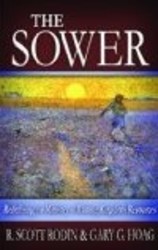The Sower: Redefining the Ministry of Raising Kingdom Resources by R. Scott Rodin and Gary G. Hoag. ECFA Press, 2010, 112 pages. ISBN-10: 0979990793; ISBN-13: 978-0979990793; hardcover, $19.95, Kindle, $9.95 at Amazon.
Reviewed by Brent Fulton
Written for pastors and organizational leaders tasked with raising funds for the ministries they represent, The Sower provides a refreshing and somewhat counterintuitive approach to the ministry of fund development.
In their introduction to the book, coauthors Scott Rodin and Gary Hoag, both seasoned fund development professionals, write: “For too long there has been too little said about how we should be raising money in the kingdom of God. Secular approaches were adopted without question by Christian organizations and ministries. As a result, while we may have had some success in raising money, we have failed to raise up godly stewards.”
In response, Rodin and Hoag propose a movement away from fund development that is focused on “closing the deal” and toward developing the hearts of people who are rich toward God. This shift requires that we reorient our view of fund raising, seeing it not as a process of reaping financial increase for God’s work but rather a process of sowing into the lives of God’s stewards. Their challenge is a much-needed reminder that it is God who ultimately gives the increase.
Rodin and Hoag lay out the biblical foundation for faithful sowing in three parts.
First, they take us through the journey from transaction to transformation. The focus here is on the steward’s spiritual development, not on his or her willingness to give.
The authors point out that much of fund development work today focuses inordinately on doing, as if it is entirely up to the fund-raiser to produce the intended results. They invite those involved in fund-raising to examine their own hearts; if our work is ultimately about developing hearts of generosity in others, we must ask whether we ourselves have prioritized the work of God in our own lives. In the authors’ words, “God is primarily concerned with the transformation of our hearts rather than the transaction of our business.”
They next contrast the bondage of a “two kingdom” life with the freedom of living as a “one-kingdom” steward. The key here is helping followers of Christ move from playing the owner to assuming their rightful stewardship role in God’s kingdom. The authors examine the four levels of relationship that were broken in the fall and subsequently won back through the redeeming work of Christ. Although our relationship with creation (quite literally, our “stuff”) is often where our desire to be owners becomes most apparent, this same desire for ownership can sabotage our relationships with God, with ourselves, and with others. The question for those engaged in raising funds is whether they are perpetuating an ownership mentality among those whom they serve, or whether they are helping them to become faithful stewards in all areas of life.
Finally, Rodin and Hoag ask whether we are encouraging giving out of a sense of legal obligation or out of a sense of joy. They close this section with a set of daily spiritual disciplines to help those engaged in fund-raising put these biblical principles into practice.
In the second half of the book, Rodin and Hoag use the metaphor of an almanac to offer “seasonal advice” for those who are called to sow into the lives of God’s stewards. Winter, for example, is a time for preparation; spring, for sowing; summer, for cultivation. In each section the authors contrast biblical steward-raising with secular fund-raising. They detail in practical terms the activities to be done in each season, and they point out the pitfalls associated with the work of each.
Throughout these seasons there is an emphasis not just on raising funds but on inviting God’s stewards into greater faithfulness in all areas of their lives, which will likely translate into greater engagement with God’s work, including the ministry being represented.
As China becomes a more prosperous nation, Chinese believers increasingly find themselves in a position to steward greater financial resources. Traditionally there has been a dearth of teaching on this topic in the Chinese church. While it is assumed that finances are needed for the Lord’s work, little is said from a biblical perspective about how this financial support is to be developed. As a result the default in Christian circles has often been to resort to secular techniques or to treat raising money as a necessary evil.
In addition to the assumption that talking about money is “unspiritual,” there are also the culturally engrained assumptions that “money stays in the family” and that it is primarily those who have great wealth who are expected to be generous.
The Sower provides a useful starting point for facing these challenges with biblical truth. In the hands of pastors, Christian teachers, and business leaders, The Sower has the potential to turn what is often viewed as an uncomfortable or unfamiliar topic into an opportunity for great spiritual growth and blessing.
For information on obtaining The Sower in simplified Chinese, please write to [email protected].
Image credit: Gaylan Yeung

Brent Fulton
Brent Fulton is the founder of ChinaSource. Dr. Fulton served as the first president of ChinaSource until 2019. Prior to his service with ChinaSource, he served from 1995 to 2000 as the managing director of the Institute for Chinese Studies at Wheaton College. From 1987 to 1995 he served as founding …View Full Bio
